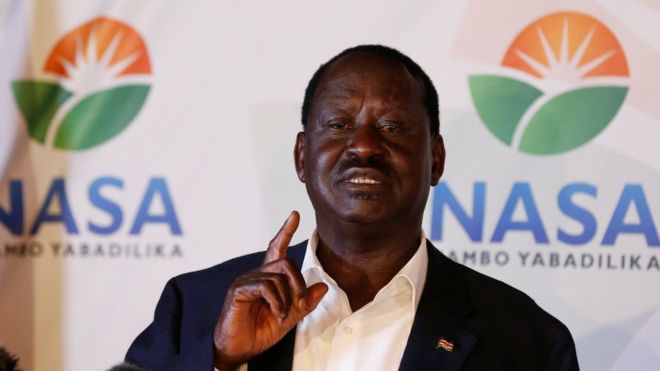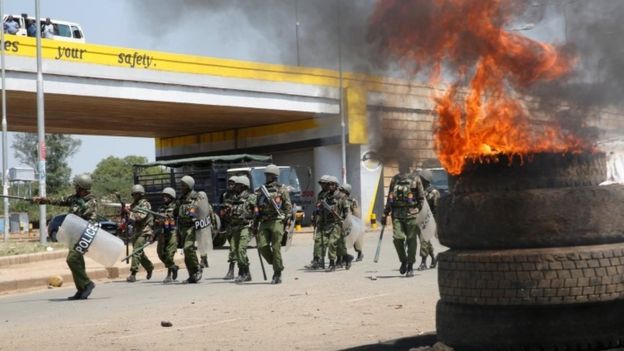Kenya opposition presidential candidate Raila Odinga has said the electoral commission’s IT system has been hacked to manipulate the election results.
He rejected provisional results from Tuesday’s vote indicating a strong lead for President Uhuru Kenyatta.
Kenya’s election chief Wafula Chebukati said he had confidence in the system but the claims would be investigated.
Many fear a repeat of the violence after a disputed election 10 years ago, and there have been calls for calm.
More than 1,100 Kenyans died and 600,000 were displaced following the 2007 vote.
Raw polling data published on the website of the Independent Electoral and Boundaries Commission (IEBC) says that with 95.3% of results in, Mr Kenyatta is leading with about 54.3%, to Mr Odinga’s 44.8% share of the vote.
These results mean Mr Kenyatta appears to be heading for a first-round victory, but they are not officials results, Mr Chebukati said, as Form 34As – filled in by presiding officers to tally votes at polling stations – have not yet been verified.
The publishing of unverified results could cause “serious political instability” if unaddressed, the Kenya Human Rights Commission said in a statement.
Mr Odinga has disputed these provisional results, saying in a tweet that his party’s own assessment puts him ahead of Mr Kenyatta.
Local election observers say they are unable to support or dismiss Mr Odinga’s claims, as they are yet to complete their parallel vote tally. The EU observer mission has yet to comment.
In order to avoid a run-off, a candidate needs 50% plus one of the votes cast and at least a 25% share of the vote in 24 of Kenya’s 47 counties. There were eight candidates in all, but apart from Mr Kenyatta and Mr Odinga, none polled more than 0.3% of the vote.
Mr Kenyatta won 50.7% of the vote at the last election in 2013, narrowly avoiding a run-off.
Speaking at a press conference Mr Odinga, who heads the National Super Alliance (Nasa), said his supporters should remain calm, but added: “I don’t control the people”. The opposition may call for “action” at a later date, his deputy, Kalonzo Musyoka, said.
Opposition supporters have protested in one of Mr Odinga’s strongholds in the capital, Nairobi.
Meanwhile, in the opposition stronghold of Kisumu, in western Kenya, a BBC reporter saw a group of several hundred of his supporters take to the streets shouting: “No Raila, no peace”.
They were then dispersed by police using tear gas.
However, these appear to be isolated incidents.
Speaking to journalists in the capital, Nairobi, Internal Security Minister Fred Matiang’i urged Kenyans to continue with their normal activities, saying he had not received any reports of unrest following the vote.
He also said that social media access could be restricted if it “threatens the security of the country”.
What is Mr Odinga’s complaint about the vote?
Mr Odinga said that the hackers had gained access to the Independent Electoral and Boundaries Commission (IEBC) computer system by using the identity of the commission’s IT manager, Chris Msando, who was killed last month.
He alleged that the hackers had “loaded an algorithm” that allowed them to alter the results and ignore the figures being transmitted from tallying centres around the country.
The opposition leader had earlier told journalists the results coming in were “fake”, because the authorities had failed to present documents verifying the results.
What does the electoral commission say?
The electoral commission has not reacted to the claims that its IT systems had been hacked, but earlier it urged people to wait calmly for the full results of Tuesday’s vote.
“During this critical phase, we urge all Kenyans to exercise restraint as we await official results from the polling stations and indeed as they start trickling in,” the commission said.
However, it admitted that a lack of mobile data coverage had delayed the delivery of the supporting documents, which formed the basis for the opposition’s earlier complaint.
There had been reports on election day of the failure of some voter-identification equipment.
Also, one in four polling stations were without strong mobile phone coverage, meaning that officials were asked to drive to the nearest town to send results.
The presidential candidates’ agents would have “special access” to the forms, though, the electoral commission said.
The Daily Nation newspaper quoted commission head Ezra Chiloba as saying only results supported by the forms had been published.
How did the voting go?
Voting passed off largely peacefully and some polling stations remained open after the scheduled 17:00 (14:00 GMT) closing time.
People started queuing early to ensure they could cast their vote. Long queues could be seen, and video footage at one polling station showed people injured after an apparent stampede.
There were reports that one man had been killed in clashes in the Kilifi area.
But there was one heartening moment when a woman gave birth to a baby girl as she queued in West Pokot to cast her ballot. New mother Pauline Chemanang called the circumstances of the birth a “blessing” and called her baby Kura, Swahili for “ballot”, according to local radio.
However, in the run-up to election day, there were claims of vote-rigging, and hate speech flyers and text messages began circulating.
Some nervous Kenyans stockpiled food and water, while police prepared emergency first aid kits in the event of violence.
What is at stake?
Mr Kenyatta is hoping for a second term in office.
Voting for the national and local assemblies has also been taking place.
Mr Odinga, 72, has run for president three times and lost each time. President Kenyatta, the 55-year-old son of Kenya’s founding president, narrowly beat him in the last election in 2013, but their rivalry is generations old – their fathers were political opponents in the 1960s.
Mr Kenyatta and his running-mate William Ruto were indicted by the International Criminal Court for their alleged roles in the bloodshed a decade ago. The case ultimately collapsed due to lack of evidence, and after key witnesses died or disappeared.
Kenya’s election in numbers:
- 47 parliamentary seats and 16 senate seats reserved for women
- Eight presidential candidates: President Uhuru Kenyatta and opposition leader Raila Odinga are favourites
- Kenyatta beat Odinga in 2013 – their fathers were also political rivals in the 1960s
- A candidate needs 50% plus one vote for first-round victory
- More than 14,000 candidates running across the six elections
- More than 45% of registered voters under 35
- Some 180,000 security officers on duty nationwide in case of trouble
BBC
 Q FM Africa's Modern Radio
Q FM Africa's Modern Radio


